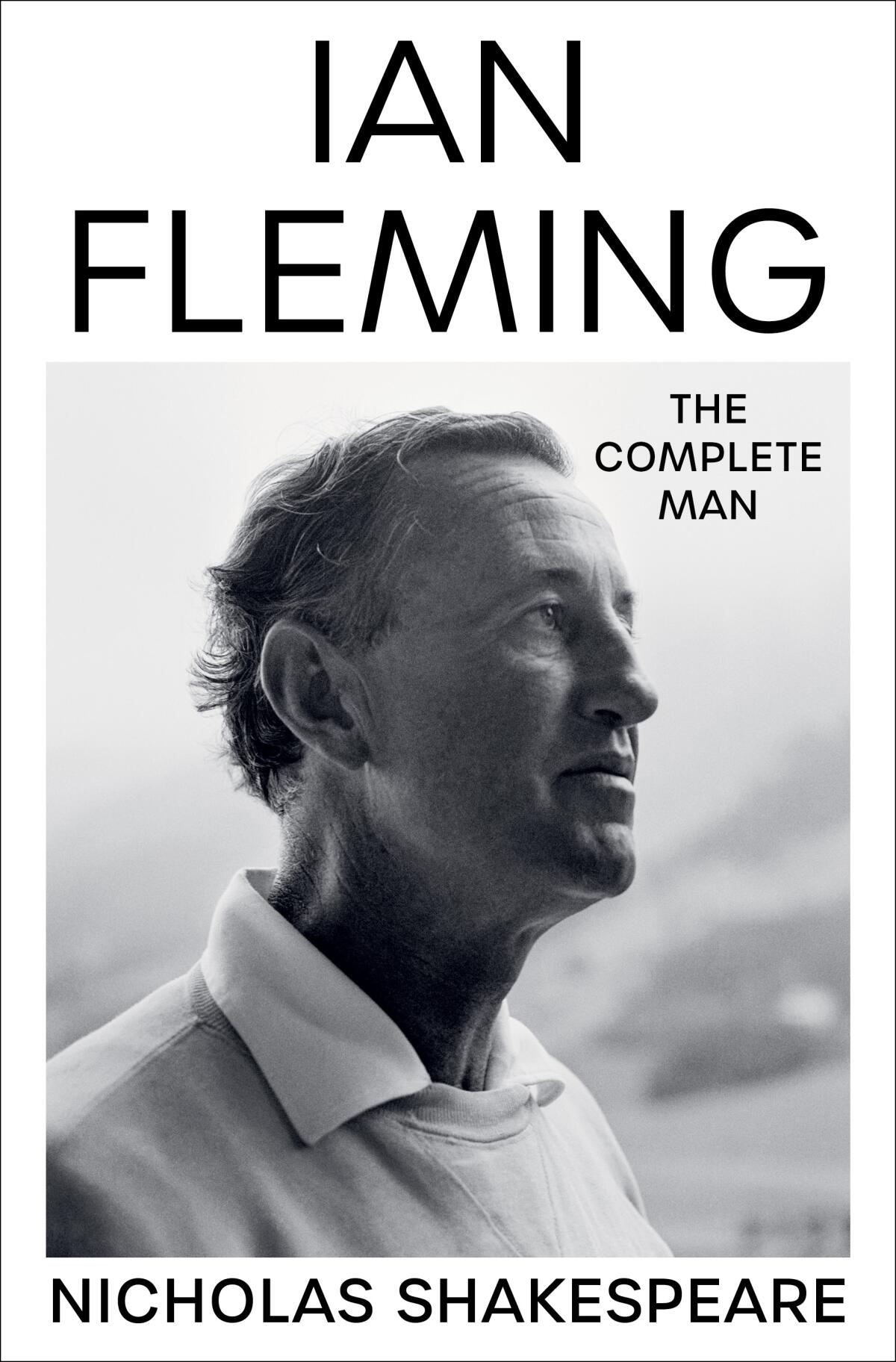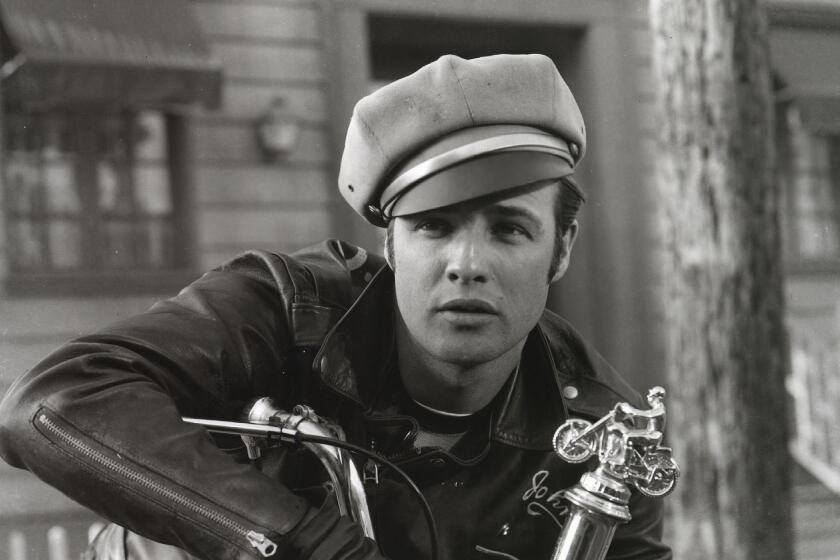James Bond’s creator lived a life to rival the spy’s
- Share via
Book Review
Ian Fleming: The Complete Man
By Nicholas Shakespeare
Harper: 864 pages, $45
If you buy books linked on our site, The Times may earn a commission from Bookshop.org, whose fees support independent bookstores.
In Nicholas Shakespeare’s new biography of author Ian Fleming, James Bond arrives on the scene rather late. But there’s a good reason to delay focusing on the secret agent Fleming created: His life before Bond is far more interesting than what followed, and much of it would find its way into the books like “bullion,” Shakespeare writes, “to be cut into slices.”
Fleming didn’t publish “Casino Royale” — the novel that introduced Bond to the world — until 1953, when Fleming was 43. By that time, he had already lived multiple lives: as a war reporter, book collector, stockbroker, merchant banker, naval intelligence operative. Fleming may have been staring at a blank page in 1953, but his advance work was abundant: His own thrill-seeking life would become the raw material of his remunerative popular art.

Shakespeare, a British novelist and the author of a biography of English writer Bruce Chatwin, is the first Fleming biographer to get his hands on just about everything Fleming wrote, which helps to make this biography somehow both capacious and breathlessly entertaining. He does a fine job of clearing up some of the hazier myths about Fleming’s tenure in British naval intelligence, even while much of that documentation remains classified. The subtitle of “Ian Fleming: The Complete Man” is apt: This is certainly the most three-dimensional portrait of a complex man who gamely tried to shore up the postwar morale of his beloved England with his fictional hero at a time when the Empire desperately needed it.
A new book traces how a gender-bending image from 1953’s ‘The Wild One’ resonated far beyond American gay subculture.
Ian Fleming was to the manner born. His grandfather Robert was one of the wealthiest merchant bankers in 19th century England. Fleming lost his father, Val, in World War I, which might have given his overbearing mother, Eve, sufficient leverage to gain control over her son’s life. It didn’t work out that way.
He was, for a time, her reclamation project: a dropout at Eton College and then a bust at Sandhurst Military Academy. He tried on a few mainstream white-collar jobs, but his short career as a stockbroker was mostly long lunches and minimal trade orders.
Fleming found his metier when Eve smoothed the way for him to work as a cub reporter at Reuters news service. As Shakespeare shows us time and again, Fleming was blessed with great timing. Dispatched to Stalin’s Russia in 1933 to cover a sensational corporate fraud trial whose docket included saboteurs and double agents, Fleming returned to England entranced with state secrets and the business of intelligence. The assignment changed the course of his life.
James Kaplan’s triple biography weaves together ‘3 Shades of Blue’ in the backstories of Miles Davis, John Coltrane and Bill Evans at the height of jazz’s cultural sway.
Through his contacts, Fleming finagled an interview with Admiral John Godfrey, the head of Naval Intelligence Division, in the hopes of pivoting into a career as a spycatcher. Again, good timing: As it happened, Godfrey was looking for a factotum. Fleming was hired as Godfrey’s assistant, but he had his boss’ ear in short order, bursting with ideas on how to fool Germany into coughing up the secrets of its supply routes, its combat readiness, its imminent military offensives. For the division, Fleming became the man with the golden mind.
Rumors about Fleming’s war heroics have swirled since the author’s death in 1964; what’s remarkable is that, by Shakespeare’s estimation, most of those outlandish rumors seem to be true. Fleming did spy on German military leaders with cameras and microphones, among other skulduggery. He was not only a crucial conduit during the war between the Naval Intelligence Division and the Americans’ Office of Strategic Services but also, according to Shakespeare, helped to create the organizational template for what became the Central Intelligence Agency. Shakespeare credits Fleming, a “seductive and persuasive force who … could achieve things not always recorded on paper,” with selling the OSS on the British model of intelligence gathering, thus sowing the seeds for a crucial partnership that helped the allies win the war.
All this, and Fleming had yet to write Agent 007 into existence. But Bond was on a slow simmer. When Churchill invited ideas from naval intelligence as to how the British might contain Hitler in the Mediterranean, Fleming’s pitch was pure 007: Line a cave on the southern coast with thick cork for quiet, then throw a wireless radio and some men inside to monitor German ship movements.
In 1942, Fleming convinced Admiral Godfrey to give him his own assault unit, whose remit included capturing German state secrets before the Germans destroyed them. Now Fleming found himself in the center of the action, his dispatches providing crucial intel for the Allies’ most ambitious offensives, including the Normandy landings that liberated Western Europe. There was also contact with Bletchley Park and the great “Enigma Machine” codebreaker Alan Turing, but Fleming’s ideas for intelligence retrieval were either too dangerous or too absurd to contemplate. Fleming stored it all up for later use in his fiction, when he “would execute in modern form those plans which (he) had conceived against the Nazis.”
Somehow Fleming, this “war-winner” as Godfrey came to call him, made time for relationships. Unlike Bond, who treats women like beach towels to be discarded after use, Fleming found and lost love, a libertine always in search of more than sex. He cultivated female patrons; one such friend, Maud Russell, supplied the funds for Fleming to build his Goldeneye compound on Jamaica’s northern coast. His marriage was troubled; Ann Fleming was a social climber who hosted literary salons and spent Fleming’s money lavishly. But Ann was the spur for Fleming to write his first Bond book; she was confident her husband could produce something great.
What finally made Fleming pick up his pen? He was mourning the decline of the Empire after the war; it was crumbling away one territory at a time. He also was stunned by the revelation that two MI6 agents had defected in 1951 as Russian spies, that his beloved British intelligence had been breached by an enemy in the most humiliating fashion. The Crown was corroding; James Bond would restore the national character by dint of his total dominion over evil, defeating the Red Menace one ghastly villain at a time. If Fleming’s Navy blues no longer fit him, he would have Bond suit up as his proxy.
Despite the runaway success of “Casino Royale,” the James Bond movie franchise was slow to gestate. By the early 1960s, Fleming’s 70-cigarettes-a-day habit had caught up with him. He suffered a devastating heart attack while embroiled in a nasty plagiarism lawsuit. There was also the matter of gradually declining sales for the Bond books, to the point where Fleming was eager to kill off his hero and move on. But then President Kennedy told a Life magazine reporter that “From Russia, With Love” was one of his favorite books, and Fleming could no longer dispose of Bond even if he tried.
What came next was 27 films that have grossed more than $7 billion. Fleming lived long enough to see only two of the films produced.
Marc Weingarten is the author of “Thirsty: William Mulholland, California Water, and the Real Chinatown.”
More to Read
A cure for the common opinion
Get thought-provoking perspectives with our weekly newsletter.
You may occasionally receive promotional content from the Los Angeles Times.











